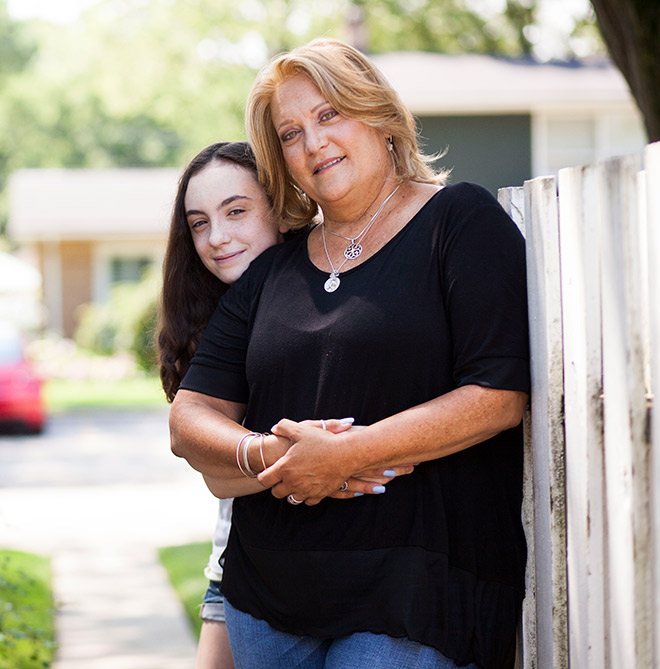Ginger Tam: Surviving Metastatic Lung Cancer Thanks to Research
“I couldn’t imagine not doing clinical trials, because I wouldn’t be here 5 and a half years later without them.”
The only thing Ginger Tam could think about was her then 8-year-old daughter. Everything the single mom from Northfield, Illinois, had ever heard about lung cancer was death.
Sitting in an examination room alone at a local hospital, where she had sought treatment for a persistent cough, Ginger had the wind knocked out of her when a resident walked in and said, “It looks like metastatic disease, and there is just so much of it.”
“I remember every detail, because you don’t forget that,” she said. “I remember where I was sitting, what I was thinking. All I could think about was my daughter. What’s going to happen to my daughter, I’m a single mom?”
After a biopsy, her doctor diagnosed her with stage 4 non-small cell lung cancer and gave her a bleak prognosis of perhaps a year or two at best. Unwilling to accept that and needing more, Ginger sought a second opinion at Rush University Medical Center, a major research hospital in nearby Chicago.
“My doctor was a great doctor and he was all about finding the next treatment and trying clinical trials,” she said. “He and my nurse showed me how to get online and look up these trials. I would never have made it if I weren’t my own advocate.”
After the initial chemotherapy treatments failed to halt the progression of her disease, Ginger’s team turned to erlotinib (Tarceva), an EGFR inhibitor, they suspected her cancer was due to EGFR mutations.
“I had an almost complete response,” Ginger said.
Unfortunately, as is often the case with targeted therapies, the response did not last. When her lung cancer began to progress again, Ginger enrolled in a clinical trial for a therapeutic designed to target the specific EGFR mutation driving the erlotinib resistance in her lung cancer. When that investigational therapeutic failed to halt her disease, Ginger underwent more chemotherapy, this time with a stronger combination of anticancer medications.
When her lung cancer progressed yet again, her team placed Ginger back on erlotinib, which kept the disease in check for about six months. At that point, she enrolled in another clinical trial. This one was testing osimertinib (Tagrisso), another drug designed to inhibit the specific EGFR mutation her lung cancer had.
Ginger stayed on osimertinib for two years.
“I got healthier on the drug. I was able to – with almost no side effects – exercise and live a normal life. I really felt stronger and healthier,” she said. “I remember my daughter saying, ‘Mommy you’re getting up earlier. Why are you getting up earlier?’ I had more energy. I was able to get up and make her breakfast.”
She was even able to take her daughter on a trip to Paris.

After two years on osimertinib, however, Ginger’s cancer progressed again and she turned to another clinical trial. This one was of an antibody-drug conjugate that delivers a chemotherapeutic agent directly to the cancer. Even though it was working, Ginger continued to look for her next treatment.
“There are some clinical trials out there that I’ve been following using osimertinib plus another drug,” she said.
So when Ginger’s cancer progressed yet again, she enrolled in a trial using the combination of osimertinib and necitumumab. Ginger is hoping that this treatment will help to keep her lung cancer at bay.
“The way my treatment has been orchestrated, how I found all the right people and the right drugs, has been pretty amazing,” she said. “I have hope, it’s just grown with each next treatment that works and each new doctor that I meet.”
For Ginger there is no other option than to hold on to hope.
“I can’t imagine not doing clinical trials because I wouldn’t be here 5 and a half years later. There just wasn’t standard treatment that would cover me,” she said.
“I am driven by my faith and my daughter especially. I have to be here for her. I’m okay. I’m still here. I’m with my kid. What else matters?”
The AACR was saddened to learn that Ginger Tam passed away on February 10, 2018. We are deeply grateful to Ginger for sharing her experience with cancer in the AACR Cancer Progress Report 2016 and for her tireless efforts to support patients and caregivers and to advocate for increased funding for cancer research. We offer our heartfelt condolences to her family and friends.



